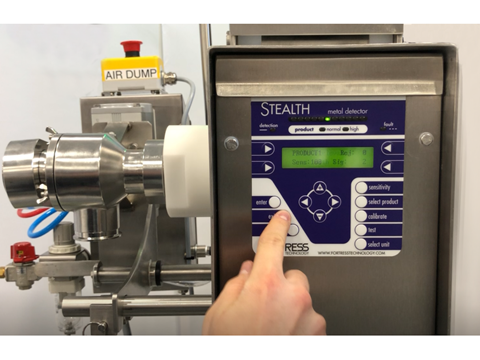
Halal meat processor Solmaz Foods has partnered with Fortress Technology to utilize four of its metal detectors for food quality control, reducing processing and product waste costs by an estimated 50%.
Solmaz Foods deploys several packaging and inspection machines to keep pace with growing production volumes. It says the addition of a fourth in-line Fortress Stealth pipeline metal detector provides further food safety assurance while simultaneously reducing labour, processing and product waste costs by an estimated 50%.
Specializing in Turkish-style meats, turkey breast, halal pepperoni, deli cuts and sujuk sausage, Solmaz Foods was founded in 2001 by father and son Tahsin and Mehmet Solmaz. The company’s plant has grown to 20,000-sq-ft and now processes 61 kilograms of halal meat monthly, which it supplies to retail outlets and restaurants.
Rapid expansion and increasing sales volumes led to the addition of an in-line Fortress Stealth pipeline metal detector to inspect meat before it is stuffed, cooked, smoked, sliced and eventually packaged. Company president Mehmet Solmaz believes that double inspections equal double reassurance that contaminants are not going undetected.
He commented: “Now we have a control where we can identify if a product has any metal pieces or other materials inside earlier in our production. That gives us better control and peace of mind that our products are safe.”
He reports that adding the Stealth pipeline has also resulted in time savings and risk reduction, adding: “I estimate that we have halved our costs. Our inline detector eliminates a lot of waste because the moment this system detects any metals in the meat, it automatically discharges that part of the batch, and we can still process the rest of it.”
In June, Chevler revealed the new addition to its Meat Saver Paper range, aiming to meet demand for brighter, more vibrant colours in meat packaging while protecting and preserving the product within. High tear and burst resistance has been implemented in an effort to prevent bones from breaking through the wrap and prevent tearing when peeling wet packaging from the meat.
Fortress Technology recently published a whitepaper on the environmental benefits of sharing best practice in the global whole and skim milk powder market. The paper states that milk waste is one of the biggest producers of greenhouse gases with a carbon footprint of around 1.1kg CO2 per litre, and the amount of milk the UK produces and subsequently wastes in a year equates to 3.3 million tonnes of CO2.
If you liked this story, you might also enjoy:
The ultimate guide to the Packaging and Packaging Waste Regulation in 2024
How are the top brands progressing on packaging sustainability?
Sustainable Innovation Report 2024: Current trends and future priorities
Everything you need to know about global plastic sustainability regulation














No comments yet